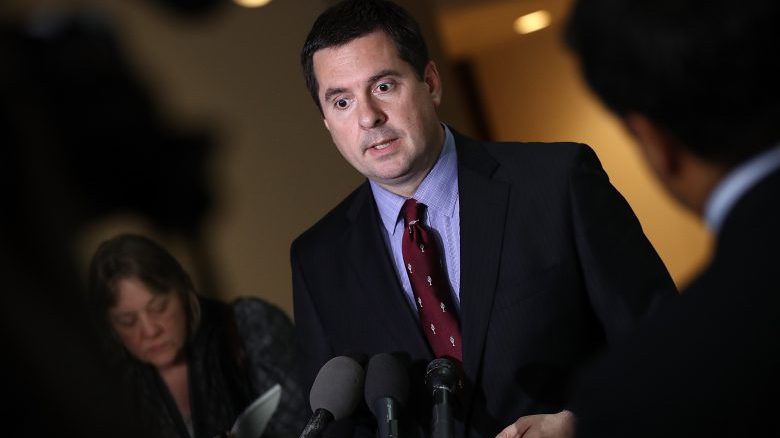
The long-awaited, controversial, GOP-authored “FISA memo” has now been released, and it alleges that the U.S. Department of Justice and the FBI used an unverified, DNC and Hillary Clinton-campaign funded dossier to obtain a warrant to conduct surveillance on Carter Page, an adviser to Trump’s presidential campaign.
The memo – which both Democrats and the FBI have described as selective and lacking full context – further alleges that the U.S. Department of Justice and the FBI failed to disclose the fact the dossier was funded by Trump’s political opponent to the court that repeatedly granted the surveillance warrant. It comes as Robert Mueller’s investigation into Trump remains ongoing, and it’s sure to spark an even greater firestorm into alleged biases by DOJ and the FBI. However, Democratic critics of the memo say that it also shows that the investigation into a different Trump aide – George Papadoupolos – played a role in the Russia investigation.
You can read the memo here on the U.S. House website or below:
The memo alleges that the FBI and DOJ omitted “material and relevant information” when applying to get the warrant. Front and center: The controversial dossier created by a former British spy, Christopher Steele, that thrust salacious and unproven allegations against Trump into the public debate.
“The ‘dossier’ compiled by Christopher Steele (Steele dossier) on behalf of the Democratic National Committee (DNC) and the Hillary Clinton campaign formed an essential part of the Carter Page FISA application,” the memo alleges. “Steele was a longtime FBI source who was paid over $160,000 by the DNC and Clinton campaign via the law firm Perkins Coie and research firm Fusion GPS, to obtain derogatory information on Donald Trump’s ties to Russia. Neither the initial application in October 2016, nor any of the renewals, disclose or reference the role of the DNC, Clinton campaign or any party/campaign in funding Steele’s efforts, even though the political origins of the Steele dossier were then known to senior DOJ and FBI officials.”
Demorats on the House Intelligence Committee released their own statement, saying the memo leaves out important context about why the FBI was interested in Page. “It fails to provide vital context and information contained in DOJ’s FISA application and renewals, and ignores why and how the FBI initiated, and the Special Counsel has continued, its counterintelligence investigation into Russia’s election interference and links to the Trump campaign,” the statement continued.

Global Initiative Against Transnational Organized CrimeBruce Ohr.
Before and after Steele was terminated as an FBI source, he “maintained contact with DOJ via then-Associate Deputy Attorney General Bruce Ohr, a senior DOJ official who worked closely with Deputy Attorneys General Yates and later Rosenstein. Shortly after the election, the FBI began interviewing Ohr, documenting his communications with Steele. For example in September 2016, Steele admitted to Ohr his feelings against then-candidate Trump when Steele said he ‘was desperate that Donald Trump not get elected and was passionate about him not being president,'” the memo says, alleging that this evidence of Steele bias was not presented to the court granting the page warrant.
Complicating matters more, Bruce Ohr’s wife, Nellie Ohr, was on the payroll of Fusion GPS. “During this same time period, Ohr’s wife (Nellie Ohr) was employed by Fusion FPS to assist in the cultivation of opposition research on Trump,” the memo alleges. “Ohr later provided the FBI with all of his wife’s opposition research, paid for by the DNC and Clinton campaign via Fusion GPS. The Ohrs’ relationship with Steele and Fusion FPS was inexplicably concealed from the FISC.”
The memo alleges that the FISA application did not mention “Steele was ultimately working on behalf of – and paid by – the DNC and Clinton campaign, or that the FBI had separately authorized payment to Steele for the same information
The memo says that the GOP findings it it “raise concerns with the legitimacy and legality of certain DOJ and FBI interactions with the Foreign Intelligence Surveillance Court (FISC)” and “represent a troubling breakdown of legal processes established to protect the American people from abuses related to the FISA process.”
The memo also alleges that the Carter Page FISA application “cited extensively” a September 23, 2016 Yahoo News article by Michael Isikoff on a trip that Page took to Moscow in July 2016. “The article does not corroborate the Steele dossier because it is derived from information leaked by Steele himself to Yahoo News,” the memo alleges. The application “incorrectly assesses that Steele did not directly provide information to Yahoo News. Steele has admitted in British court filings that he met with Yahoo News – and several other outlets – in September 2016 at the direction of Fusion GPS. Perkins Coie was aware of Steele’s initial media contacts because they hosted at least one meeting in Washington D.C. in 2016 with Steele and Fusion GPS where this matter was discussed.”
Steele “improperly concealed from and lied to the FBI about” his media contacts, the memo alleges.
The head of the FBI’s counterintelligence division, Assistant Director Bill Priestap, said that corroboration of the Steele dossier was in its “infancy” at the time of the initial Page FISA application, the memo alleges. After Steele was terminated, an FBI source validation report “conducted by an independent unit within FBI assessed Steele’s reporting as only minimally corroborated.”
The FISA application “relied on Steele’s past record of credible reporting on other unrelated matters” but “it ignored or concealed his anti-Trump financial and ideological motivations,” the memo says. Deputy Director Andrew McCabe testified that “no surveillance warrant would have been sought from the FISC without the Steele dossier information.”
The Page FISA application also mentioned information regarding “fellow Trump campaign adviser George Papadopoulos, but there is no evidence of any cooperation or conspiracy between Page and Papadopoulos. The Papadopoulos information triggered the opening of an FBI counterintelligence investigation in late July 2016 by FBI agent Pete Strzok,” the memo reads.
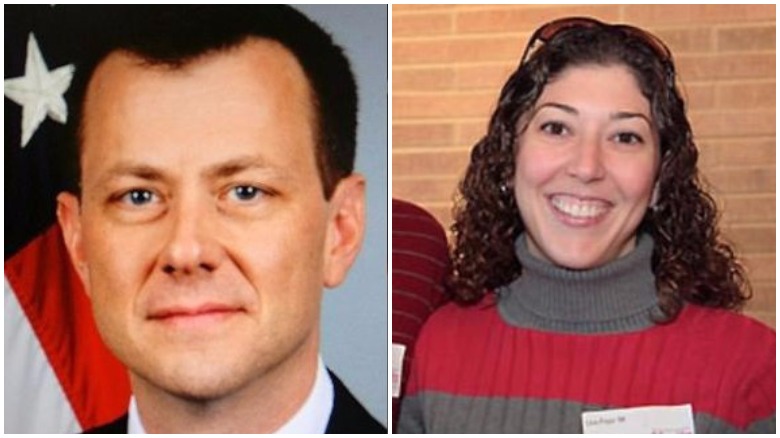
U.S. Department of Justice/Ohio State UniversityPeter Strzok and Lisa Page.
The memo states that Strzok was reassigned by the Special Counsel’s Office to FBI Human Resources for “improper text messages with his mistress, FBI Attorney Lisa Page,” who is not related to Carter Page. The memo states that Page and Strzok “both demonstrated a clear bias against Trump and in favor of Clinton, whom Strzok had also investigated. The Strzok/Lisa Page texts also reflect extensive discussions about the investigation, orchestrating leaks to the media, and include a meeting with Deputy Director McCable to discuss an “insurance” policy against President Trump’s election.
Excerpts of the controversial memo first appeared in conservative news sites. Fox News first reported that the memo claims the FBI used the dossier to obtain the warrant against Carter Page.
The memo alleges that, on Oct. 21, 2016, the DOJ and FBI “sought and received a FISA probable cause order…authorizing electronic surveillance of Carter Page from the FISC.” Page was a U.S. citizen and volunteer adviser to the Trump presidential campaign. Either the director of deputy director of the FBI had to first certify the application. The Attorney General, Deputy Attorney General, or the Senate-confirmed Assistant Attorney General for the National Security Division then had to sign off on it.
The FBI and DOJ obtained a FISA warrant targeting Carter Page and three FISA renewals from the FISC. FISA orders on American citizens have to be renewed every 90 days with a separate finding of probably cause. Then FBI director James Comey signed three FISA applications in question on the FBI’s behalf, Deputy Director Andrew McCabe signed one, then DAG Sally Yates, then Acting DAG Dana Boente, and DAG Rod Rosenstein each signed one or more FISA applications, according to the FISA memo.
Comey tweeted an incendiary comment as the memo was about to be released: “All should appreciate the FBI speaking up. I wish more of our leaders would,” Comey tweeted. “But take heart: American history shows that, in the long run, weasels and liars never hold the field, so long as good people stand up. Not a lot of schools or streets named for Joe McCarthy.” After the memo was released, he wrote, “That’s it? Dishonest and misleading memo wrecked the House intel committee, destroyed trust with Intelligence Community, damaged relationship with FISA court, and inexcusably exposed classified investigation of an American citizen. For what? DOJ & FBI must keep doing their jobs.”
The memo alleges that “Steele was suspended and then terminated as an FBI source for what the FBI defines as the most serious of violations – an unauthorized disclosure to the media of his relationship with the FBI in an October 30, 2016 Mother Jones article by David Corn.”
Around noon on the east coast, it was reported that President Donald Trump had transferred the memo back to the House Intelligence Committee. Conservative news outlets then started reporting pieces of it.
“A disputed dossier was used by the FBI to obtain a warrant to spy on members of the Trump team, and the FISA court was never told the dossier was political opposition research, according to a House Intelligence Committee memo expected to be released in full today,” Fox News reported on February 2.
President Donald Trump set the stage on Friday morning, tweeting, “The top Leadership and Investigators of the FBI and the Justice Department have politicized the sacred investigative process in favor of Democrats and against Republicans – something which would have been unthinkable just a short time ago. Rank & File are great people!”
He then quoted a conservative activist named Tom Fitton, tweeting, “‘You had Hillary Clinton and the Democratic Party try to hide the fact that they gave money to GPS Fusion to create a Dossier which was used by their allies in the Obama Administration to convince a Court misleadingly, by all accounts, to spy on the Trump Team.’ Tom Fitton, JW.”
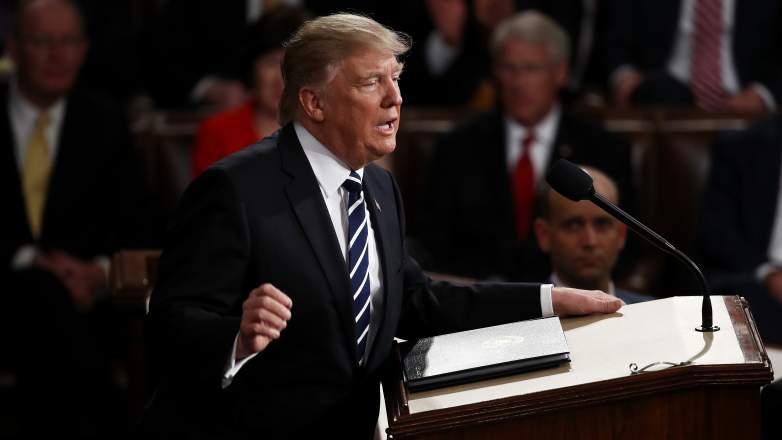
GettyU.S. President Donald Trump addresses a joint session of Congress in 2017.
What is the memo? It’s four-page document that was authored by the staff of House Intelligence Committee chairman Rep. Devin Nunes, R-Calif. That committee voted to release the memo, and Trump could have stopped its release. However, the president chose not to do so.
Democrats and the FBI have cried foul about the memo. Some Democrats fear that the memo’s release is an attempt by Republicans and Trump to deflect attention from the Robert Mueller probe or, worse, is laying the foundation for a Saturday Night Massacre style ouster. The Republicans who had seen the memo before its release likened it to Watergate and alleged that it shows abuses of power and bias against Trump by the Justice Department and the FBI.
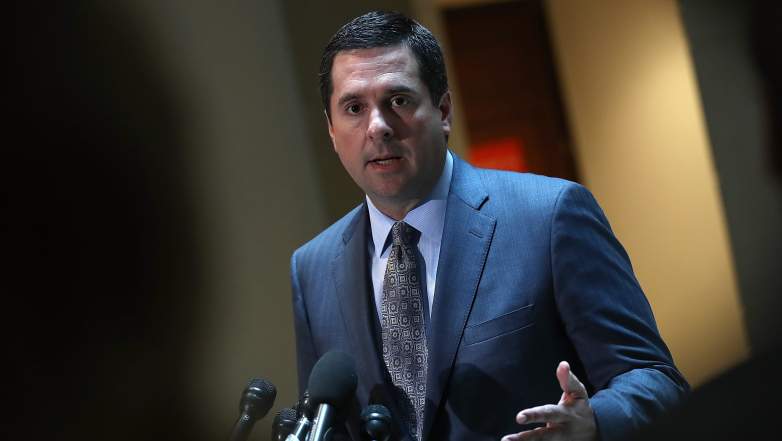
GettyRep. Devin Nunes (R-CA)
The FBI’s investigation into Hillary’s Clinton’s email server – which resulted in no criminal charges – is front and center when it comes to Republican concerns. Republicans have also been incensed by texts showing two FBI agents once involved in the probe, Peter Strzok and Lisa Page, disliked Trump.
The FBI released a statement raising “grave concerns” about the memo’s release.
“With regard to the House Intelligence Committee’s memorandum, the FBI was provided a limited opportunity to review this memo the day before the committee voted to release it,” the FBI said in a statement. “As expressed during our initial review, we have grave concerns about material omissions of fact that fundamentally impact the memo’s accuracy.”
Nunes responded, according to Fox News, “Having stonewalled Congress’ demands for information for nearly a year, it’s no surprise to see the FBI and DOJ issue spurious objections to allowing the American people to see information related to surveillance abuses at these agencies.”
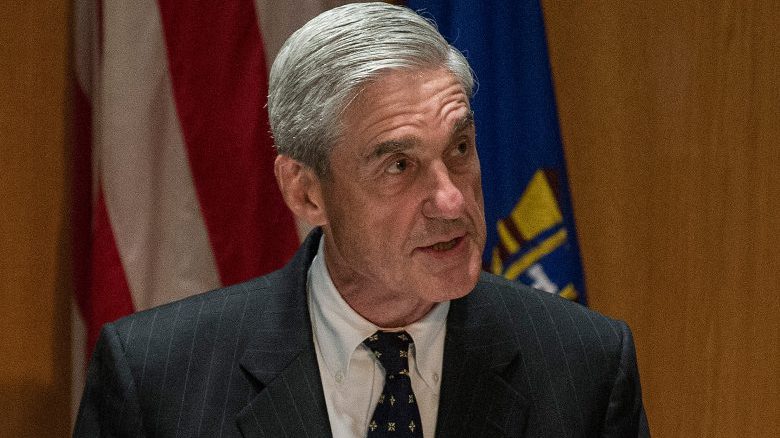
GettyRobert S. Mueller III.
The vote to release the memo reportedly fell along partisan lines, with Democrats considering whether to issue their own counter memo.
“If Americans’ civil liberties were abused, then that needs to come to light so that doesn’t happen again,” House Speaker Paul Ryan said of the memo. “This memo is not an indictment of the FBI, of the Department of Justice, it does not impugn the Mueller investigation or the deputy attorney general.